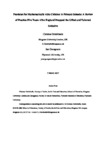Provision for mathematically able children in primary schools: a review of practice five years after England dropped the gifted and talented initiative
| dc.contributor.author | Dimitriadis, C | |
| dc.contributor.author | Traisnel, Margaux | |
| dc.date.accessioned | 2017-10-03T14:59:07Z | |
| dc.date.issued | 2017-06-05 | |
| dc.identifier.issn | 0013-1911 | |
| dc.identifier.issn | 1465-3397 | |
| dc.identifier.uri | http://hdl.handle.net/10026.1/10001 | |
| dc.description | peerreview_statement: The publishing and review policy for this title is described in its Aims & Scope. aims_and_scope_url: http://www.tandfonline.com/action/journalInformation?show=aimsScope&journalCode=cedr20 | |
| dc.description.abstract |
After the abandonment of the Gifted and Talented initiative and the recent developments in mathematics educational policy (i.e. the new national curriculum and the “mastery” initiative), this research project aimed to explore the current primary school situation regarding educating the “most able” children in mathematics, along with teachers’ views, experiences and perceived needs. This was a pilot research study gathering insights from a small number of schools in order to identify areas that could be improved by larger-scale research studies. The findings obtained from 49 schools under four local educational authorities in southwest England suggested that the education of children with the ability or potential to excel in mathematics has reached a crucial stage. There is a real need for specialised support and guidance in recognising and developing mathematical potential for classroom teachers and school leaders who try on their own to discover what could enable them to meet the government’s educational target of achieving “excellence everywhere”. This support should have underpinnings from theory and research, preventing our schools from using questionable practices or repeating methods that have failed in the past. This article highlights research areas specifically for this reason. It also raises some questions with potential implications for the special educational needs coordinator’s role, as well as for implementing new initiatives like the mathematics “mastery curriculum”. | |
| dc.format.extent | 358-380 | |
| dc.language | en | |
| dc.language.iso | en | |
| dc.publisher | Informa UK Limited | |
| dc.subject | Able children | |
| dc.subject | gifted education | |
| dc.subject | mathematics education | |
| dc.subject | primary | |
| dc.subject | elementary years | |
| dc.subject | education policy | |
| dc.subject | mastery | |
| dc.title | Provision for mathematically able children in primary schools: a review of practice five years after England dropped the gifted and talented initiative | |
| dc.type | journal-article | |
| dc.type | Journal Article | |
| plymouth.author-url | https://www.webofscience.com/api/gateway?GWVersion=2&SrcApp=PARTNER_APP&SrcAuth=LinksAMR&KeyUT=WOS:000428293700006&DestLinkType=FullRecord&DestApp=ALL_WOS&UsrCustomerID=11bb513d99f797142bcfeffcc58ea008 | |
| plymouth.issue | 3 | |
| plymouth.volume | 70 | |
| plymouth.publication-status | Published | |
| plymouth.journal | Educational Review | |
| dc.identifier.doi | 10.1080/00131911.2017.1330252 | |
| plymouth.organisational-group | /Plymouth | |
| plymouth.organisational-group | /Plymouth/Faculty of Arts, Humanities and Business | |
| plymouth.organisational-group | /Plymouth/Faculty of Arts, Humanities and Business/Plymouth Institute of Education | |
| plymouth.organisational-group | /Plymouth/REF 2021 Researchers by UoA | |
| plymouth.organisational-group | /Plymouth/REF 2021 Researchers by UoA/UoA23 Education | |
| plymouth.organisational-group | /Plymouth/Research Groups | |
| plymouth.organisational-group | /Plymouth/Research Groups/Institute of Health and Community | |
| plymouth.organisational-group | /Plymouth/Users by role | |
| plymouth.organisational-group | /Plymouth/Users by role/Academics | |
| dcterms.dateAccepted | 2017-05-10 | |
| dc.rights.embargodate | 2018-12-5 | |
| dc.identifier.eissn | 1465-3397 | |
| dc.rights.embargoperiod | 18 months | |
| rioxxterms.versionofrecord | 10.1080/00131911.2017.1330252 | |
| rioxxterms.licenseref.uri | http://www.rioxx.net/licenses/under-embargo-all-rights-reserved | |
| rioxxterms.licenseref.startdate | 2017-06-05 | |
| rioxxterms.type | Journal Article/Review |


